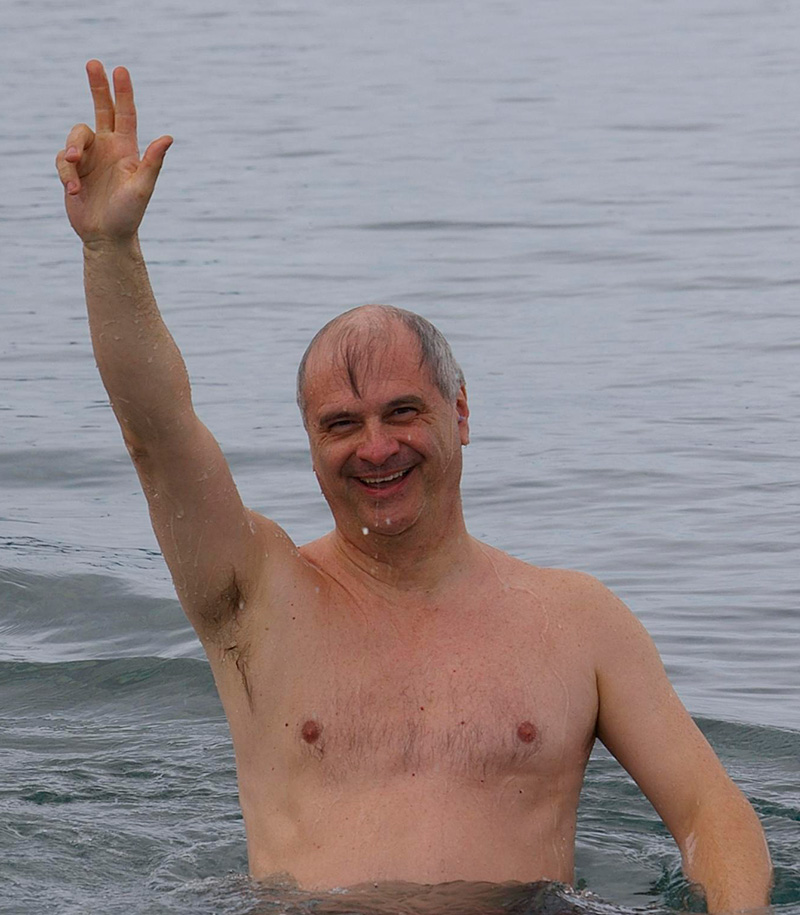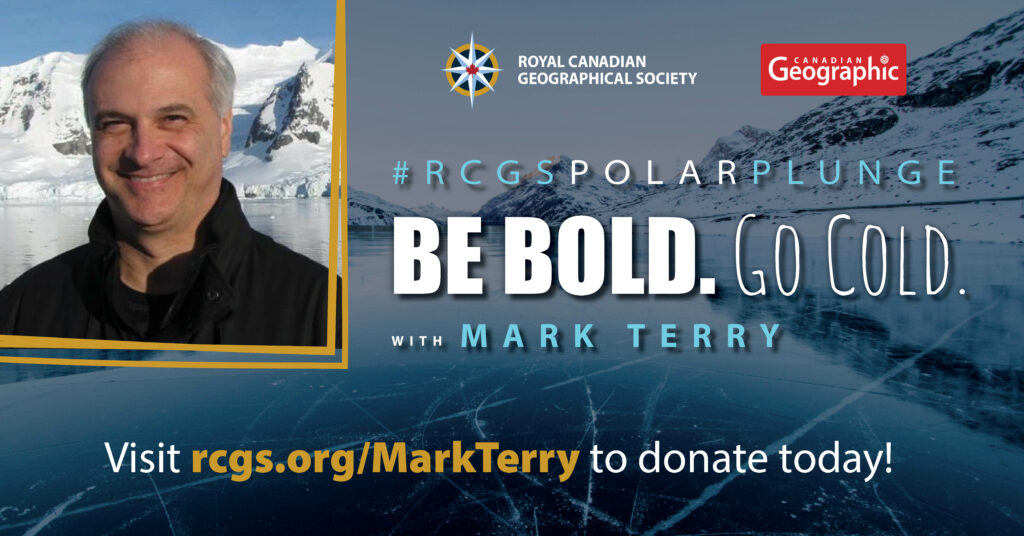
By Joseph Burrell, communications officer, YFile
For York Research Fellow and Environmental & Urban Change Adjunct Professor Mark Terry – whether he’s raising awareness about the health of far-flung ecosystems, or raising funds for environmentalist groups – there’s no such thing as too cold.
With two near-zero degree dives on his record, and a third pencilled into his calendar, Terry doesn’t see himself as a career cold-water swimmer – but considering that his first attempts took place in Antarctica and the Arctic Ocean, respectively, he has more expertise in that field than most.

Indeed, his commitment to studying the world’s most remote polar and oceanic biomes is rivalled only by his dedication to the University community. Terry’s history with York spans many decades, beginning with his BA in English and media studies earned from Glendon Campus in 1980. With his career in writing, directing, acting and even stunt driving in films well under way, he eventually returned to York to receive his master’s degree in 2015 and his PhD in 2019. For each, he wrote theses that considered documentary films as catalysts for change.
Between those academic pursuits, Terry found his passion as an environmental documentarian. Never shying away from the hands-on approach, Terry underscored critical points in his films about the rapid warming of the polar ice caps, and the precarious existence of wildlife there, by jumping into the frigid depths himself.
“The first [time] was actually sub-zero temperatures in Antarctica for the film The Antarctica Challenge: A Global Warning. That polar plunge was used as a post-credit scene – long before Marvel started doing it, by the way – to illustrate how warm the water surrounding the world’s coldest continent was becoming,” Terry said. “The Arctic swim was for my most recent documentary, The Changing Face of Iceland. That polar plunge, and the film itself, can be seen on campus at the Nat Taylor Cinema on March 9 at 12:30 p.m.”
As for his preferred swimming spot, Terry would choose Antarctica over the Arctic because the latter requires jumping from a ship into deep, cold water – a dangerous feat even for experienced professionals. Antarctica, on the other hand, allows for easy wading across its icy shoals, plus “there’s the added bonus of swimming with playful penguins.”
For his next bone-chilling stunt, Terry will join the Royal Canadian Geographical Society’s (RCGS) Polar Plunge fundraiser for the “Canadian Geographic Explore” podcast.
Terry, an RGCS Fellow, takes his plunge from Sunnyside Beach on March 6 at noon. Although the approaching end of winter means warming air temperatures, Terry explained that early March is when Lake Ontario’s historical average water temperature is actually at its coldest. Even with his prior experience, he admitted that taking the plunge is “always a little bit stressful.”
The annual event is sponsored by Canadian Geographic Magazine and features a cast of high-profile environmental researchers, reporters and politicians diving into icy waters across Canada to raise money for polar research and knowledge dissemination.

Some of Terry’s fellow plunge participants are already well known to him from having collaborated on projects in the past. Others participating include: Catherine McKenna, former federal minister of the environment and climate change; Perry Bellegarde, former chief of the Assembly of First Nations; David McGuffin, CBC foreign correspondent; among others.
“When Catherine McKenna was [a federal minister,] we met with youth groups at COP24 to listen to their demands for policy participation and to showcase their films in my ongoing research project, the Youth Climate Report – now a digital database of more than 700 films on the United Nations Framework Convention on Climate Change (UNFCCC),” Terry said. “She was, and still is, a true environmental champion.”
In light of the continued success of the Youth Climate Report, in which Terry played a pivotal role, the United Nations recognized the “Geo-Doc” film format with a Sustainable Development Goals (SDGs) Action Award in 2021. Around that time, York also formally acknowledged the importance of the SDGs by integrating them into its University Academic Plan 2020 – 2025.
Terry identified the enthusiasm for filmmaking and environmental research, fostered in him throughout his time at York, as the primary motivator driving his work with the RCGS College of Fellows. “There are many exceptional members of the College of Fellows,” he said. “I am proud to be among their ranks.”
“I’ve crossed the Northwest Passage with them and their work was presented in a film I made called The Polar Explorer. Its premiere at COP16 in Cancun led to a new resolution addressing rising sea levels,” Terry added. “It’s a mutually beneficial relationship.”
Click here to support Terry’s plunge.
Do you have a “secret life” or know someone else at York who does? Visit the My Secret Life questionnaire and tell us what makes you shine, or nominate someone you know at York.
